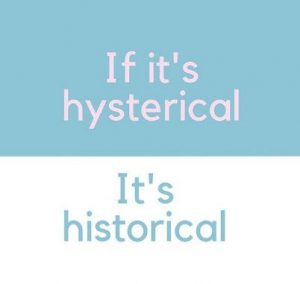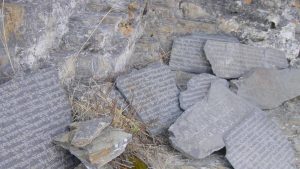Eikev 2021: Marriage on the Broken Rocks
by devadmin | July 29, 2021 9:33 pm
Marriage on the Broken Rocks
A big hearty mazel tov to our friends Bonnie and Heshie Schertz upon the upcoming marriage- taking place right now mamish- of their beautiful daughter Jennifer, who will shortly be walking down to the chupphah where she will be wed to Rafi Neuberger, he the son of Peshi and Rabbi Yaakov Neuberger. We have known Jennifer since birth, watched her blossom and wish upon her and her new husband to be, many years of blissful marriage. Mazel tov to the entire extended Schertz and Miller families and mazel tov to the entire extended Neuberger family.
Raboyseyee and Ladies:
 Shoin, Shabbis Nachamu is in the rear-view mirror and Rosh Hashono is mamish around the corner. We know this because as Shabbis Nachamu approaches, the shuls are in high gear. Almost in synch, emails, and in a few instances, real mail mamish -envelope and paper- though kimat a relic of the past, arrives with seat requests for the coming High Holy Days. It’s time to pay the bills and redeem your pledges lest seats are withheld. It’s soon time to decide where you want to daven this year. For those belonging to but one shul, the choice is rather easy; show up or don’t. Those who hold multiple memberships -as do many including the Ois and family- it’s discussion time. On the other hand, the Delta variant is lurking and don’t be surprised if shuls call last minute audibles with regard to masks, and outdoor minyonim. Is the backyard breakaway minyan making a comeback? Bottom line: to paraphrase General Eisenhower: planning is essential; all plans are useless. The RBSO runs the world.
Shoin, Shabbis Nachamu is in the rear-view mirror and Rosh Hashono is mamish around the corner. We know this because as Shabbis Nachamu approaches, the shuls are in high gear. Almost in synch, emails, and in a few instances, real mail mamish -envelope and paper- though kimat a relic of the past, arrives with seat requests for the coming High Holy Days. It’s time to pay the bills and redeem your pledges lest seats are withheld. It’s soon time to decide where you want to daven this year. For those belonging to but one shul, the choice is rather easy; show up or don’t. Those who hold multiple memberships -as do many including the Ois and family- it’s discussion time. On the other hand, the Delta variant is lurking and don’t be surprised if shuls call last minute audibles with regard to masks, and outdoor minyonim. Is the backyard breakaway minyan making a comeback? Bottom line: to paraphrase General Eisenhower: planning is essential; all plans are useless. The RBSO runs the world.

In yet another sign that Rosh Hashono is mamish around the corner, in a few weeks, mail-carriers’ bags will be stuffed and weighed down with various calendars -also a relic of the past- as shuls and other organizations make a push for additional donations. It’s kimat calendar season, the time of year deceased parents come to life – kimat tichiyas hameysim (resurrection of the dead) as they too are the recipients of calendars from myriad organizations and yeshivas. Who needs calendars in 2021, ver veyst? Why are they still being printed? Ver veyst?
Shoin, let’s take a quick peek into Parshas Eikev where Moishe is still waxing nostalgic to the Yiddin in the days before his passing. This week -as he has been doing since Parshas Devorim -he is in historical mode- again reminding the Yiddin of the various sins they committed over the past forty years. Why the Yiddin needed constant reminders, ver veyst? Was Moishe identifying with his female tendencies? Years ago, a good chaver told me that when his wife gets angry, she never gets hysterical; instead, she becomes historical and remembers every sin he committed since the day he met her.

Back to Moishe excoriating the Yiddin: Weren’t all the sinners long dead? Is it not abundantly clear from the text that all Yiddin involved in the eygel caper and other sins were long dead and buried? It is! In fact, those directly involved with the eygel -approximately 3000 Yiddin- were instantly killed. As to other sinners, those spooked by the Miraglim, those who partook in the sex orgies arranged by the Midianite and Moabite hot shiksa, have long come and gone, if you chap. Moreover, back in Parshas Shelach, in year two of midbar wanderings, the RBSO declared that all males above the age of twenty (at the time) would die during the next thirty-eight years of the midbar experience. It’s year forty: they’re all dead by now. And if that’s the case, to whom was Moishe talking about past sins? And why? Why does Moishe -throughout these parshas constantly remind the innocent next generation of the sins of their fathers? Was it not enough that they were all orphaned? Is it nice to remind the innocent children of sins committed by their parents? It’s not! That being said, who are we to argue with the heylige Toirah? Were these words meant to motivate? If Moishe decided to remind the new generation – those about to enter the land- of the sins of their fathers’ that’s just how it is. Still the heylige Ois remains puzzled: Veyter.
Shoin, just last week –on shabbis, Parshas Voeschanan, we read the Aseres Hadibros (Ten Commandments). We read what was written (carved out) onto the second set that Moishe came down with. Recall that back in Shmois (Parshas Ki Sisa) we read how he came down with set #1, ober upon his arrival to the camp he found the Yiddin engaged in avoido zoro (idol worship), reveling and worse- efsher even in orgy mode- as they danced and partied unbecomingly around the golden calf. A startled Moishe – though tipped off by the RBSO that the people had gone rouge- threw the two tablets to the ground and shoin. What happened next? What happened to the shards, to the letters of the words is colorfully discussed by many a sage and exegete. Avada you can read all that in Ki Sisa. Ober today and this week, here in Parshas Eikev, it’s forty years later and Moishe is still smarting over the incident? And though long dead and buried are the perpetrators, Moishe reminds the Yiddin of what they did and how he reacted. Bottom line: Moishe felt the need to recall the events of the day. We too shall dedicate a few paragraphs as we read what a number of sages and others had to say about this entire disturbing incident. Let’s examine the facts, and questions many have asked. We begin with the one posik (Devorim 9:17) which reads azoy:
“So, I took hold of the two Tablets, cast them out of my two hands, and shattered them before your eyes.”
 And de ershte kasha is (the first question is azoy): Why did Moishe break the Tablets? And we begin with a very interesting medrish, this one -as is the case with hundreds of others- invoking a sexual example to teach the lesson of the day. Says the medrish (Shmois Rabbah 43:1 and 46:1, Midrash Tanchuma Ki Sisa 30 and Eikev 11, Avos d’Rav Noson 2:3 and Ibn Ezra), azoy: What can this incident be compared to? To a nobleman who wished to marry a woman through an agent. The agent went and found that the woman had been promiscuous with another man. What did the agent—who was totally innocent—do? He took the marriage document that was given to him by the nobleman, and tore it up. He said, “It is better that this woman be judged as a single woman and not as a married woman!” And this is precisely what Moishe did. When he saw what the Jewish people had done, he took the Tablets and broke them, [so he could argue] that if the Jewish people had seen the punishment for idol worship [written there], they would not have sinned.
And de ershte kasha is (the first question is azoy): Why did Moishe break the Tablets? And we begin with a very interesting medrish, this one -as is the case with hundreds of others- invoking a sexual example to teach the lesson of the day. Says the medrish (Shmois Rabbah 43:1 and 46:1, Midrash Tanchuma Ki Sisa 30 and Eikev 11, Avos d’Rav Noson 2:3 and Ibn Ezra), azoy: What can this incident be compared to? To a nobleman who wished to marry a woman through an agent. The agent went and found that the woman had been promiscuous with another man. What did the agent—who was totally innocent—do? He took the marriage document that was given to him by the nobleman, and tore it up. He said, “It is better that this woman be judged as a single woman and not as a married woman!” And this is precisely what Moishe did. When he saw what the Jewish people had done, he took the Tablets and broke them, [so he could argue] that if the Jewish people had seen the punishment for idol worship [written there], they would not have sinned.
And that Raboyseyee is why the authors of the medrish were geniuses mamish. They chapped that teaching the heylige Toirah by interjecting examples -specifically ones that are sexually laced- that by definition, it would lead to better memory retention. Bottom line: people would never ever forget why Moishe -shocked upon seeing the Yiddin – mamish 40 days after marrying the RBSO in a mountaintop ceremony, were already down below and involved in an extramarital affair. Want more?
A few pisukim later, Moishe tells the Yiddin (Ch. 9, v. 17) azoy: “Vo’ashabreim l’ei’neichem” – And I broke them in front of your eyes. And the question is azoy: given that the RBSO’s Holy name appeared on the tablets -numerous times- why wasn’t there a prohibition of erasing Hashem’s Holy Name? Was he not versant in the rules of “sheimos” (the proper way of discarding items that carry the RBSO’s holy name)? How could Moishe do that? Says another medrish (Yalkut Yehudah) -also using sex to teach us the lesson, azoy: Moishe ruled that the Yiddin were likened to an unfaithful wife. Just forty days after their proverbial marriage to the RBSO, they were reveling around an idol; cheating mamish on their spouse!? What to do? By breaking the tablets-marriage on the rocks mamish- Moishe symbolically destroyed the marriage contract between the RBSO and the Yiddin, so as to lessen their punishment, and hopefully restoring peace between the RBSO and His wife, the b’nei Yisroel. The lesson: chap a piece, break the peace! This is akin to erasing the RBSO’s name in the “soita” water procedure. Since it is permitted to erase Hashem’s Holy Name for establishing peace between but one man and his wife, surely for the national good, for the entire nation of Yiddin, this was permitted. Moishe’s teaching moment successful: No one forgets the cheating scandal!
As mentioned above, many weigh in on this matter; let’s explore a few. What taka was Moishe thinking? Who gave him permission to break them? Where they his to break? Did the RBSO tell Moishe to keep them for himself? And if Moishe wasn’t happy with the sights he encountered, why not give them back to the RBSO? Perhaps he should have hid them and presented them to the Yiddin at a better time? Have you ever wanted to surprise your girlfriend, and or wife, with a nice card or gift and then mamish minutes before, exchanged harsh words instead? Of course, you have; everyone has! Did you tear up the card or destroy the gift? Not! You put it away and dusted it off another time. What’s pshat he broke them and now he’s reminding the Yiddin of what they did wrong? Did Moishe lose his temper? Was this befitting a leader of his stature? For Moishe, leader of the Yiddin through the most difficult of times, the one with the greatest appreciation for these Luchos—to then hurl them callously to the ground in anger? What’s pshat? And even if he felt that the Yiddin no longer deserved these Luchos—was there no other way other than smashing them? What taka happened here? And was his behavior out of line? And what did the RBSO have to say about this incident?
And says Rabeinu Bachayei (Shmois 32:16) azoy: It is a wonder concerning Moishe, trusted personal servant of HaShem. How did he have the brazenness to break the Luchos which were Michtav Elokim, the writing of the RBSO? If the Jewish people sinned and were not worthy of the Toirah, he should have returned the Toirah to its Host and asked of HaShem what should be done with it. If a king of flesh and blood sends his sealed letter through the hand of his trusted personal servant to the royal ministers, and they do not want to take it, it is appropriate for the faithful servant to return it to the king, and not to conduct himself in a disgraceful manner and tear it up. Want more?
Says the Moishav Zekenim (Shmois 32:19), azoy: Moishe should have buried them under the mountain in a respectful manner. One cannot say that just because the letters flew out, the holiness therefore completely left them. The letters flew out? How and where? Shoin, we’ll get to that soon. Moreover, says the heylige Gemora (Shabbis 115b), azoy: A Sefer Toirah which was erased, if it does not have 85 letters (legible) it is not saved from a fire on shabbis. However, even that law is only true in regards to desecrating the shabbis in order to save the Toirah from the fire; but it is certainly forbidden to act with it in a disgraceful manner. And says the heylige Gemora (Megilah 26b): A Sefer Toirah which is worn out requires burial. In other words: it does epes appear that Moishe acted a shtikel or more cavalierly with the Luchos. These were holy tablets written by the RBSO Himself and Moishe threw them to the ground? Say it’s not so.
The bottom line: many a sage has questioned Moishe’s actions; were they correct? And while the questions are legitimate, don’t be surprised that every sage and exegete jumped to his defense. If Moishe did it, he must have had a damn good reason. They only bicker about what his rationale may have been. Let us explore what Moishe may have been thinking at the time? Or, might we argue that he wasn’t thinking; he just reacted emotionally upon witnessing the golden calf.
Lest you think that Moishe acted impetuously and did not think it through, says the Maharsho who brings a shtikel the Gemora in Yevomis that says azoy: Moishe’s reaction was not an emotional outburst. It was an intellectual decision. The Maharsho asks that if it was an intellectual decision, why would he wait? The RBSO had already told him -before descending the mountain- that they sinned. He should have broken them on the spot. Shoin, that question too has many answers, ober the Maharsho says azoy: “He waited because even though he knew intellectually that what they did was wrong, until he actually saw it with his own eyes, it didn’t penetrate his being to the point where he felt that he could break the Luchos. The bottom line: seeing is believing. Moishe was not mikabael (accepting) that the newly married Yiddin were already involved in an extramarital affair with a calf. Another bottom line: hearing about an affair cannot be compared to being chapped in the act. Being chapped is powerful. Just because you hear something, doesn’t mean you have the full picture of what it is; seeing is believing. Using this logic, we chap why Moishe waited before he broke the Luchos.
Ober says the Tzur Maor that Moishe’s waiting until he descended, was intentional. He wanted his violent reaction to their actions to have a real long-lasting effect on the people. He wanted the Yiddin to witness his breaking of the tablets that the RBSO gave him. Once chapped, there was no way Moishe was able to give the tablets to the Yiddin. They were no longer deserving. His mission was to have them chap what they lost. Accordingly, he broke the tablets in front of them.
Says Rabeinu Bachayei, azoy: Moishe broke the Luchos to avoid having to present them to a nation which had proven itself unworthy of them. According to this opinion, Moishe did not want the Yiddin to receive the Ten Commandments, for it would make their deed look worse in the eyes of the prosecuting angels. If it could be argued that the Yiddin were unaware that their deeds would void their “betrothal” to the One Above, it would mitigate the severity of their sin.
And says the medrish (Midrash D Rebee Noson (2)) azoy: by the time he threw them down to the ground, the sapphire tablets were already blank. The holy letters spelling out the Aseres Hadibros were gone. He looked at them and saw that the words had flown away. He said, “How can I give the Yiddin the Luchos with no substance? Rather, I will grab them and break them.” Where did the letters go? They flew away, back to heaven. Back to Rabaynu Bechaya who explains azoy: once the letters flew out, the tablets themselves just became like stones. They had no value. Says the medrish, “At that point, they were just like stones, like a dead body.” Just when the soul leaves the body, all you have there is a body. And listen to this: several medroshim describe a virtual tug-of-war over the Luchos. Some, to include Tanchuma (Eikev 11), Yerushalmi Taanis (4:5) describe the RBSO holding on (whatever that means when it comes to the RBSO) to one side of the Luchos–trying to prevent Moishe from taking them down from Sinai, while Moishe held on to the other. Others such as Avos d’Rav Noson (2:3) and Sh’mois Rabbah (46:3) describe the 70 elders trying to grab the Luchos away from Moishe to try to prevent him from breaking them. Is that what happened? Are these medroshim to be taken literally? Ver Veyst? Or, as one rabbi famously stated, all medroshim are true; some just didn’t happen yet. Avada one should not believe that an actual tug-of-war -more of a camp color-war activity- broke out over the Luchos, as the RBSO doesn’t have physical hands to grab onto one end. Moreover, had the RBSO really wanted to take the Luchos back from Moishe, would Moishe have prevailed? What’s taka pshat? What’s the medrish teaching us? Seemingly, they want us to believe that the RBSO didn’t really want to let Moishe take the Luchos with him (either to prevent him from giving it to the nation or to prevent him from breaking them) and the nation (or at least its leaders) didn’t want Moishe to break them and destroy the symbol of their covenant with G-d. The bottom line: what happened in that tug of war, ver veyst; what we know with certainty is that Moishe came down and smashed them. The RBSO avada knew the plan; He made the plan. That plan included a version 2.0 of the Luchos. Another bottom line: the Yiddin who were seemingly excited to accept version 1.0, were not ready to strictly adhere to them. Hence the eygel caper.
Earlier we asked how Moishe could break the RBSO’s holy Luchos? Was the RBSO upset with him? Says the heylige Gemora (Shabbis 87a), azoy: Three things Moishe did of his own accord and the RBSO agreed to his judgment… He broke the Luchos. What was his reasoning? He said, “with regard to the Korban Pesach (Passover Offering) which is only one of the 613 mitzvos, the heylige Toirah says, ‘any strange person (idol worshiper) should not eat from it;’ the Luchos contain the entire Toirah and the Jewish people are transgressors; how much more so [that it should not be given to them]!”
 Ober, how do we -from this shtikel Gemora- know that the RBSO agreed with his judgment? And for that answer Raboyseyee, we turn to the very last Rashi in the entire heylige Toirah where we read azoy: For it is written (Shemois 34:1), “asher shebartem” meaning “which you have broken” referring of course to the first Luchos. Says Reish Lokish that the word “asher” can be juxtaposed to mean “Yasher Kochacha (thank you) for having broken it.” In other words, the RBSO was mamish pleased and thanked Moishe for his actions. The Yiddin were just not ready for them. Exactly how their attitudes changed and how they became ready for a second set in but a few months, is for another day. And says the Medrish Shemois Rabah 46:1, azoy:
Ober, how do we -from this shtikel Gemora- know that the RBSO agreed with his judgment? And for that answer Raboyseyee, we turn to the very last Rashi in the entire heylige Toirah where we read azoy: For it is written (Shemois 34:1), “asher shebartem” meaning “which you have broken” referring of course to the first Luchos. Says Reish Lokish that the word “asher” can be juxtaposed to mean “Yasher Kochacha (thank you) for having broken it.” In other words, the RBSO was mamish pleased and thanked Moishe for his actions. The Yiddin were just not ready for them. Exactly how their attitudes changed and how they became ready for a second set in but a few months, is for another day. And says the Medrish Shemois Rabah 46:1, azoy:
Moishe began to be pained over the breaking of the Luchos. The RBSO said to him, “Do not be pained over the first Luchos, for they were only the Ten Commandments. The second Luchos I will give to you, will be accompanied by Halachos (laws), Midrash (extrapolations) and Agadah (homily).”
The final bottom lines: The king’s messenger tearing up the marriage contract didn’t preclude the royal wedding from ever taking place; the contract just had to be rewritten as a result of the breach, the affair the Yiddin had with the golden calf. Both parties got over it and veyter gigagin (case closed and onward). The parties worked out their disagreements and decided to marry again and so stay. In real life, it’s not quite that simple.
A gittin Shabbis –
The Heylige Oisvorfer Ruv
Yitz Grossman
Source URL: https://oisvorfer.com/eikev-2021-marriage-on-the-broken-rocks/